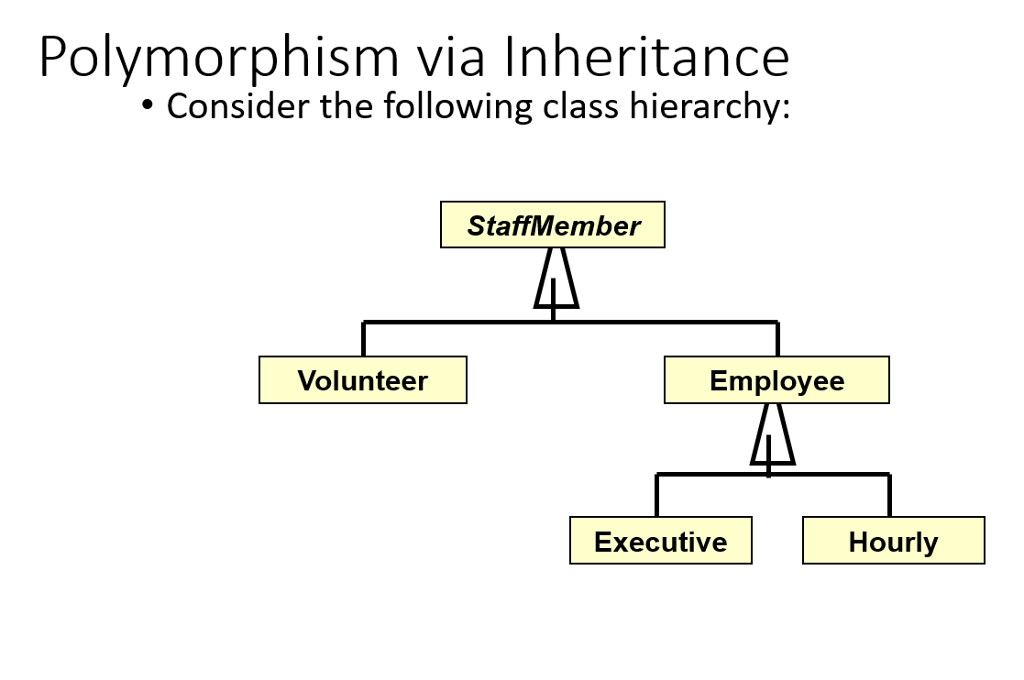Question
Objective: Implementation of Java ArrayList API Refer to the StaffMember class hierarchy Diagram, write a main program to perform following specifications by using java.util.ArrayList. Initialize
Objective: Implementation of Java ArrayList API
Refer to the StaffMember class hierarchy Diagram, write a main program to perform following specifications by using java.util.ArrayList.
Initialize an ArrayList object that reads all employee records from Staff.java. Allow user to enter employee name to display employee record;including employee type and pay rate, Delete employee record, Modify employees Address field , Display error if the user attempts to remove name that is not on the list. At the end of program, display all employee records with updated information.
Use the code provided: Staff.java, StaffMember.java, Volunteer.java, Employee.java, Executive.java and Hourly.java.

Staff.java :
public class Staff
{
private StaffMember[] staffList;
//-----------------------------------------------------------------
// Constructor: Sets up the list of staff members.
//-----------------------------------------------------------------
public Staff ()
{
staffList = new StaffMember[6];
staffList[0] = new Executive ("Sam", "123 Main Line",
"555-0469", "123-45-6789", 2423.07);
staffList[1] = new Employee ("Carla", "456 Off Line",
"555-0101", "987-65-4321", 1246.15);
staffList[2] = new Employee ("Woody", "789 Off Rocker",
"555-0000", "010-20-3040", 1169.23);
staffList[3] = new Hourly ("Diane", "678 Fifth Ave.",
"555-0690", "958-47-3625", 10.55);
staffList[4] = new Hourly ("Norm", "987 Suds Blvd.",
"555-8374","456-78-9000", 11.2);
staffList[5] = new Volunteer ("Cliff", "321 Duds Lane",
"555-7282");
((Executive)staffList[0]).awardBonus (500.00);
((Hourly)staffList[3]).addHours (40);
((Hourly)staffList[4]).addHours (30);
}
//-----------------------------------------------------------------
// Pays all staff members.
//-----------------------------------------------------------------
public void payday ()
{
double amount;
for (int count=0; count
{
System.out.println (staffList[count]);
amount = staffList[count].pay(); // polymorphic
if (amount == 0.0)
System.out.println ("Thanks!");
else
System.out.println ("Paid: " + amount);
System.out.println ("-----------------------------------");
}
}
public StaffMember getStaff(int i)
{
StaffMember st = staffList[i];
return st;
}
public int getSize()
{
int sz = staffList.length;
return sz;
}
}
StaffMember.java :
abstract public class StaffMember { protected String name; protected String address; protected String phone;
//----------------------------------------------------------------- // Constructor: Sets up this staff member using the specified // information. //----------------------------------------------------------------- public StaffMember (String eName, String eAddress, String ePhone) { name = eName; address = eAddress; phone = ePhone; }
//----------------------------------------------------------------- // Returns a string including the basic employee information. //----------------------------------------------------------------- public String toString() { String result = "Name: " + name + " ";
result += "Address: " + address + " "; result += "Phone: " + phone;
return result; }
//----------------------------------------------------------------- // Derived classes must define the pay method for each type of // employee. //----------------------------------------------------------------- public abstract double pay(); }
Volunteer.java :
public class Volunteer extends StaffMember { //----------------------------------------------------------------- // Constructor: Sets up this volunteer using the specified // information. //----------------------------------------------------------------- public Volunteer (String eName, String eAddress, String ePhone) { super (eName, eAddress, ePhone); }
//----------------------------------------------------------------- // Returns a zero pay value for this volunteer. //----------------------------------------------------------------- public double pay() { return 0.0; } }
Employee.java :
public class Employee extends StaffMember { protected String socialSecurityNumber; protected double payRate; //----------------------------------------------------------------- // Constructor: Sets up this employee with the specified // information. //----------------------------------------------------------------- public Employee (String eName, String eAddress, String ePhone, String socSecNumber, double rate) { super (eName, eAddress, ePhone);
socialSecurityNumber = socSecNumber; payRate = rate; }
//----------------------------------------------------------------- // Returns information about an employee as a string. //----------------------------------------------------------------- public String toString() { String result = super.toString();
result += " Social Security Number: " + socialSecurityNumber;
return result; }
//----------------------------------------------------------------- // Returns the pay rate for this employee. //----------------------------------------------------------------- public double pay() { return payRate; } }
Executive.java :
public class Executive extends Employee { private double bonus;
//----------------------------------------------------------------- // Constructor: Sets up this executive with the specified // information. //----------------------------------------------------------------- public Executive (String eName, String eAddress, String ePhone, String socSecNumber, double rate) { super (eName, eAddress, ePhone, socSecNumber, rate);
bonus = 0; // bonus has yet to be awarded }
//----------------------------------------------------------------- // Awards the specified bonus to this executive. //----------------------------------------------------------------- public void awardBonus (double execBonus) { bonus = execBonus; }
//----------------------------------------------------------------- // Computes and returns the pay for an executive, which is the // regular employee payment plus a one-time bonus. //----------------------------------------------------------------- public double pay() { double payment = super.pay() + bonus;
bonus = 0;
return payment; } }
Hourly.java :
public class Hourly extends Employee { private int hoursWorked;
//----------------------------------------------------------------- // Constructor: Sets up this hourly employee using the specified // information. //----------------------------------------------------------------- public Hourly (String eName, String eAddress, String ePhone, String socSecNumber, double rate) { super (eName, eAddress, ePhone, socSecNumber, rate);
hoursWorked = 0; }
//----------------------------------------------------------------- // Adds the specified number of hours to this employee's // accumulated hours. //----------------------------------------------------------------- public void addHours (int moreHours) { hoursWorked += moreHours; }
//----------------------------------------------------------------- // Computes and returns the pay for this hourly employee. //----------------------------------------------------------------- public double pay() { double payment = payRate * hoursWorked;
hoursWorked = 0;
return payment; }
//----------------------------------------------------------------- // Returns information about this hourly employee as a string. //----------------------------------------------------------------- public String toString() { String result = super.toString();
result += " Current hours: " + hoursWorked;
return result; } }
Polymorphism via Inheritance Consider the following class hierarchy StaffMember Volunteer Employee Executive HourlyStep by Step Solution
There are 3 Steps involved in it
Step: 1

Get Instant Access to Expert-Tailored Solutions
See step-by-step solutions with expert insights and AI powered tools for academic success
Step: 2

Step: 3

Ace Your Homework with AI
Get the answers you need in no time with our AI-driven, step-by-step assistance
Get Started


